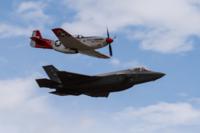On July 4, 2015, two Russian TU-95 "Bear" bombers flew a little too close to the United States. Since the aircraft are both nuclear capable and neither filed their intent to fly so close to the American coastline, they were intercepted by American fighter planes, as is the standard procedure in those situations.
It turned out they simply wanted to bring a message to the American people. One of the Russian pilots radioed the intercepting F-22 Raptors: "Good morning, American pilots, we are here to greet you on your Fourth of July Independence Day."
It wasn’t the first time the Russians reached out to the United States on the holiday, and it certainly wasn’t the last. They did the same thing in 2012, off the coast of California. In 2015, Russian pilots actually visited two coastal sites just short of American soil.
Two Tupolev bombers flew into the North American Air Defense Identification Zone (ADIZ) near Alaska -- roughly 200 miles beyond the U.S. coastline -- and were intercepted by Air Force fighters. That’s where they delivered their goodwill message to the American pilots.

U.S. airspace begins 12 miles from the coast. The ADIZ was established so that the U.S. could identify incoming aircraft as early as possible. If a foreign military aircraft is going to enter the zone, it must file and close a flight plan specifying the duration of penetration at least 15 minutes before it enters the zone. Failure to file will result in a military interception, as in the case of these Russian military aircraft.
An hour after the bombers sent the message off Alaska, two more Tupolev bombers were intercepted by F-15 Eagle fighters off the coast of California. Except, there was no greeting from either of those Russian pilots. As the bombers were intercepted, Russian President Vladimir Putin called then-President Barack Obama to wish him a happy Fourth of July.
Russian aircraft are routinely intercepted in the ADIZ off the United States' West Coast, though not always on the 4th of July. Defense officials estimate American fighters have intercepted Russian aircraft an average of 10 times every year since 2014.
In March and April 2020, U.S. and Canadian planes intercepted two Russian Tu-142 and two IL-38 maritime reconnaissance aircraft in the Alaskan Air Defense Identification Zone.
That may seem like a lot, especially for early in the year, but it pales in comparison to living near Russian soil. NATO reported almost 300 interceptions of Russian aircraft in 2019 alone.
Air intercepts are generally peaceful situations, often ending with the fighter escorting the violating aircraft out of American airspace. When the Russian Bear pilot just dropped in to wish his American counterpart a happy Independence Day, he was likely content to fly away and leave the Raptor pilot with an interesting story to tell his superiors back on the ground.
Want to Learn More About Military Life?
Whether you're thinking of joining the military, looking for post-military careers or keeping up with military life and benefits, Military.com has you covered. Subscribe to Military.com to have military news, updates and resources delivered directly to your inbox.
















